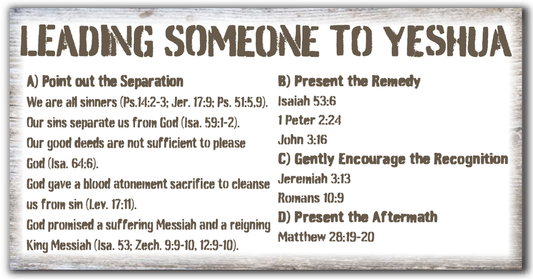WHAT THE CHURCH HAS RECEIVED FROM THE JEWS
All together, five specific things that the Church has received from the Jews can be listed: the Scriptures, the Savior, salvation, the concept of the local church, and spiritual blessings.
A. The Scriptures
The first thing that the Church has received from the Jews is the Scriptures. This is brought out by four Scriptures.
1. Deuteronomy 4:7–8
For what great nation is there, that has a god so nigh unto them, as Jehovah our God is whensoever we call upon him? And what great nation is there, that has statutes and ordinances so righteous as all this law, which I set before you this day?
The Mosaic Law served as God’s standard of righteousness. If a Jew in the Old Testament wanted to know what the righteous standard of God was, he had the Mosaic Law to turn to. It served as the rule of life for the Old Testament saint. But these two verses point out that this was given uniquely to Israel.
There were two unique things, which God gave to Israel. The first thing that was uniquely given to Israel was the concept of one God and God revealed Himself to Israel in a way that He has not revealed Himself to any other single nation. The second thing, which God gave uniquely to the Jewish people, is the Law, which was the primary Scriptures of that day. With the completion of the Law, God gave the first five books of Scripture, and for a while, these were the only Scriptures. Again, this was something God gave to the Jewish people.
2. Psalm 147:19–20
He showed his word unto Jacob, His statutes and his ordinances unto Israel. He has not dealt so with any nation: And as for his ordinances, they have not known them. Praise ye Jehovah.
This passage states that God had revealed these scriptural truths to Israel in a way that He had not revealed them to any other nation. No other nation has had this unique privilege. Again, the emphasis is that God had given these things to the Jewish people.
3. Romans 3:1–2
What advantage then has the Jew? or what is the profit of circumcision? Much every way: first of all, that they were intrusted with the oracles of God.
Paul points out in these verses the supreme privileges of Israel. The advantage of the Jew was not in the realm of salvation, for Jews are not saved because they are Jews. Jews, like Gentiles, are saved by grace through faith in the substitutionary death and Resurrection of Yeshua (Jesus) the Messiah. But they do have the advantage in another field, and that is in the realm of Scripture, for unto the Jews were revealed the oracles of God, the Scriptures.
The supreme privilege of Israel is not that salvation comes to the Jews because they are Jews, rather it is because they were given the Scriptures, that they have received the revelation of salvation.
4. Romans 9:4
who are Israelites; whose is the adoption, and the glory, and the covenants, and the giving of the law, and the service of God, and the promises.
Paul lists various features or facets of the Scriptures, pointing out that these are in the ownership of the Israelites. There are four facets of Scripture given to the Israelites. First, the covenants, which refer to the four unfulfilled, unconditional, eternal covenants God has made with Israel: the Abrahamic Covenant, the Land Covenant, the Davidic Covenant, and the New Covenant. The second facet he mentions is the giving of the law, which refers to the one covenant God made with Israel that was both conditional and temporary: the Mosaic Covenant. The third facet is the service, which refers to the Levitical service, the Levitical system; the whole realm of Scripture dealing with the Levitical system also belongs to the Israelites. The fourth facet is the promises, specifically, the promises of the prophets.
These various facets include all of the promises of the prophets, but especially the promise of Messianic salvation. But it is more than that, because the word promises is in the plural.
5. Conclusions
There are three conclusions regarding the Jews and the Scriptures. First, the Scriptures are of the Jews in that they were produced by the Jews, and they were guarded by the Jews; this is true both of the Old and New Testaments.
Secondly, the Scriptures are to the Jews; they were committed to the Jews for safe keeping. It was not a day when the printing press was around, so mass production of copies of the Scriptures was impossible. Thus, the Jews were instructed to be the guardians of the Word of God. When one old text became worn out, too old to use, the Jews would carefully make new copies; it was committed to them for safe-keeping.
Thirdly, the Scriptures are about the Jews. They record Israel’s redemptive history, but they also predict Israel’s redemptive future. Thus, the Church has indeed received the Scriptures from the Jews.
B. The Savior
The second thing that the Church has received from the Jews is the Savior in that Yeshua was a Jew.
1. The Jewishness of the Savior
The Jewishness of the Savior is brought out several times in Scripture. For example, in John 4:9, the Samaritan woman clearly recognized Him to be a Jew for she stated: How is it that you, being a Jew, ask drink of me, who am a Samaritan woman?
Later, in Romans 9:5, after stating that the Scriptures are of the Jews in verse 4, Paul adds in verse 5: of whom is Christ as concerning the flesh. As to His flesh, His humanity, Yeshua was a Jew and He belonged to the Jewish people.
Hebrews 7:14 states: For it is evident that our Lord has sprung out of Judah, meaning He was a member of the Tribe of Judah; being a member of the Tribe of Judah meant that He was indeed a Jew.
Another passage that clearly brings out His Jewishness is Galatians 4:1–7. The main point of the context is the distinction between the Abrahamic Covenant and the Mosaic Covenant. Verses 4–7 state: but when the fulness of the time came, God sent forth his Son, born of a woman, born under the law, that he might redeem them that were under the law, that we might receive the adoption of sons. And because ye are sons, God sent forth the Spirit of his Son into our hearts, crying, Abba, Father. So that you are no longer a bondservant, but a son; and if a son, then an heir through God.
According to this passage, Jesus was born under the law, meaning He was a Jew. Furthermore, He was born a Jew for two reasons as seen in the switching of pronouns between the third person pronoun them to the first person pronoun we in verse 5. The first reason that He was born a Jew was to redeem them [Jews] that were under the law. The second reason He was born a Jew was that we [Jews and Gentiles together] might receive the adoption of sons.
2. The Concept of the Kinsman Redeemer
Another passage concerning the importance of the Jewishness of Yeshua is Hebrews 2:14–17: Since then the children are sharers in flesh and blood, he also himself in like manner partook of the same; that through death he might bring to nought him that had the power of death, that is, the devil; and might deliver all them who through fear of death were all their lifetime subject to bondage. For verily not to angels does he give help, but he gives help to the seed of Abraham. Wherefore it behooved him in all things to be made like unto his brethren, that he might become a merciful and faithful high priest in things pertaining to God, to make propitiation for the sins of the people.
The emphasis in this passage is to show why Jesus had to come as a human being and, more specifically, as a Jewish human being. It distinguishes, first of all, between fallen angels and fallen men.
Verse 16 points out that God did not choose to provide salvation for angels and, for that reason, Yeshua never took on “angelanity.” He never became an angel to become a substitutionary atonement for other angels. God provided salvation only for humanity, and so God became human. But because there was a special connection with the work of redemption in connection to Israel under the Law, verse 16 points out that He did not come as just any man; He came specifically as a member of the seed of Abraham. He came as a Jew.
The background of what the writer is dealing with is the kinsman redeemer concept of the Old Testament. There were several ways that a Jew could get himself into trouble under the Law. One of those ways was to fall into a state of indebtedness beyond his ability to repay. If that happened to him, there was only one option available to him; that was to sell himself into slavery, work for his master for six years, and then be released on the seventh year, the Sabbatical year.
Once he sold himself into slavery, there were two other options open to him. The first option was to serve out the six years. The second option depended upon having a kinsman who was willing to pay off his indebtedness to release him from slavery early. However, under the Law there were three requirements to being a kinsman redeemer. First, he had to be the next of kin; a total stranger could not do it. Secondly, he had to have the price of redemption. He had to have enough resources of his own to pay off his kinsman’s debts. And thirdly, he had to be willing to pay the price, for the Law did not make it mandatory; it was optional.
That is what is happening in this context. Since, humanly speaking, by serving sin, man becomes a slave to sin; everybody, all humanity, has become enslaved to sin. The Jewish people, in particular, because of their inability to keep the Law perfectly, fell under the enslavement of the curse of the Law. In order to fulfill the first requirement of kinship, Jesus had to be born a human being, but specifically a Jew. Secondly, He had to have the price of redemption, which, in this case, was innocent blood. And thirdly, He had to be willing to pay the price, because the Law did not make it mandatory. Indeed, Yeshua was willing to pay the price. In John 10:18, it was Jesus who stated: No one takes [my life] from me, but I lay it down of myself. Thus, the whole concept of His redemptive work is closely tied into the fact that Yeshua was a Jew.
C. Salvation
The third thing that the Church has received from the Jews is salvation. As He was speaking to a Samaritan woman who had her own way of salvation, Jesus stated in John 4:22: Ye worship that which ye know not: we worship that which we know; for salvation is from the Jews.
There are three ways that salvation is from the Jews. First, the promise of Messianic salvation was given to the Jews. Secondly, there is the plan of salvation in that it required Jewish blood. And thirdly, the first proclaimers of salvation were Jews. In these ways, indeed, the Church has received salvation from the Jews.
D. The Concept of the Local Church
The fourth thing that the Church has received from the Jews is the concept of the local church. This comes from the concept of the assembly, the local synagogue, which is an entirely Jewish concept. Even the term “elder,” which is the main term used for church leadership, has Jewish origins, because there were elders in the Jewish community. So the whole concept of the local assembly is a Jewish concept.
Furthermore, the practice of baptism was a Jewish practice long before it became a church practice.
Finally, even communion is something that came from the Jews, because communion is a shortened version of the Jewish Passover. The two major elements of the Passover, unleavened bread and wine, are the two things that Jesus brought into the church concept to be observed until He returns.
The Church has received these three things from the Jews: the local assembly, baptism, and communion, all having Jewish origins.
E. Spiritual Blessings
The fifth thing that the Church has received from the Jews is spiritual blessings. This is brought out very clearly by two significant passages.
1. Romans 15:27
Yea, it has been their good pleasure; and their debtors they are. For if the Gentiles have been made partakers of their spiritual things, they owe it to them also to minister unto them in [material] things.
This verse clearly states that Gentile believers have become partakers of Jewish spiritual blessings.
2. Ephesians 2:11–16 and 3:5–6
Exactly what that means is detailed in the second passage, which is in two parts. The first part is Ephesians 2:11–16: Wherefore remember, that once ye, the Gentiles in the flesh, who are called Uncircumcision by that which is called Circumcision, in the flesh, made by hands; that ye were at that time separate from Christ, alienated from the commonwealth of Israel, and strangers from the covenants of the promise, having no hope and without God in the world. But now in Christ Jesus ye that once were far off are made nigh in the blood of Christ. For he is our peace, who made both one, and broke down the middle wall of partition, having abolished in his flesh the enmity, even the law of commandments contained in ordinances; that he might create in himself of the two one new man, so making peace; and might reconcile them both in one body unto God through the cross, having slain the enmity thereby.
The second part is in Ephesians 3:5–6: which in other generations was not made known unto the sons of men, as it has now been revealed unto his holy apostles and prophets in the Spirit; to wit, that the Gentiles are fellow heirs, and fellow members of the body, and fellow partakers of the promise in Christ Jesus through the gospel.
The point of these passages is that God made four unfulfilled covenants with Israel, which were unconditional and eternal. All of God’s spiritual blessings are mediated by these four covenants. They also point out that God made another covenant, the Mosaic Covenant, which was the law of commandments (2:15). One of the many reasons for this other covenant, the temporary one, was to serve as a middle wall of partition to keep Gentiles as Gentiles away from enjoying Jewish spiritual blessings. When Yeshua died, He broke down this middle wall of partition. Now, by faith in the Messiah, Gentiles as Gentiles can begin to enjoy the spiritual blessings of these Jewish covenants. They have not become “taker overs,” but partakers (3:6). The spiritual blessings of salvation, the indwelling Holy Spirit, provision, care, answered prayer are Jewish spiritual blessings of which Gentile believers have become partakers.
Excerpt from Dr Arnold Fruchtenbaum:
MBS179 THE CHURCH AND THE JEWS: Pg 3-8





